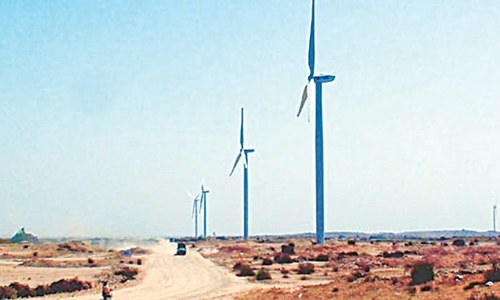• PM’s aide says accord to be applicable after clearance of dues
• Two years needed to frame new purchase regime
ISLAMABAD: Minister for Information and Broadcasting Senator Shibli Faraz has said that provision of cheap electricity to consumers on a sustainable basis is the government’s top priority.
Addressing a news conference along with Special Assistant to the Prime Minister on Power Shahzad Qasim on Saturday, the minister said that as a first major step towards providing cheap electricity to consumers, the government signed a basic agreement with Independent Power Producers (IPPs).
Senator Faraz said expensive power contracts had been signed in the past, as the previous governments had failed to negotiate with the IPPs for the benefit of consumers. However, he said, it was not possible for the present government to undo the contracts unilaterally though Prime Minister Imran Khan wanted to address the issue of expensive electricity on an immediate basis.
For this purpose, he said, the government constituted a team that held negotiations with the IPPs to revisit the old contracts.
The minister said under the new agreement signed with the IPPs, payments would only be made for the electricity acquired and consumed instead of the total installed capacity of a particular power plant. Also, the equity return would be made in rupees rather than US dollars, as was the past practice, he said.
He said the government intended to enhance the share of renewable energy to 20 to 25 per cent in the overall energy mix by 2030, as it would also help reduce dependence on petroleum fuel and the cost of power production.
Read: 27-year power generation plan ignores local energy resources
While giving details of the recently signed memorandum of understanding with the IPPs, the special assistant on power said there was a need to exercise caution as sovereign guarantees with the IPPs were involved. He highlighted that among the key milestones achieved in the latest MoU with the IPPs was to hold fuel efficiency tests of plants and the results would be shared with the electric power regulator as well.
“The IPPs would not only have to follow the prescribed limit of Nepra but also the savings would have to be shared with the government,” he said, adding that it would help reduce the cost of electricity.
Mr Qasim said late payment surcharge to be paid by the government to the IPPs, which was earlier Kibor plus 4.5 per cent, was dropped to Kibor plus 2 per cent only.
The special assistant said the government was working to change the whole power purchase regime with the IPPs, as the current system guaranteed payment of electricity to the IPPs as per their installed capacity even if the actual purchase of electricity was much lower.
“It will take between one and two years to devise a new power purchase regime,” he added.
He said the MoU would be applicable only after the dues were cleared. He added that the tariff of various hydro power plants of Wapda were being rationalised at a uniform rate, while currently different projects had different rate of return.
Responding to a question, Mr Qasim said the MoU had been signed and its impact would be felt by the consumers after some time but he did not specify the time when the consumers would get the benefit of the new agreement.
Published in Dawn, August 16th, 2020













































